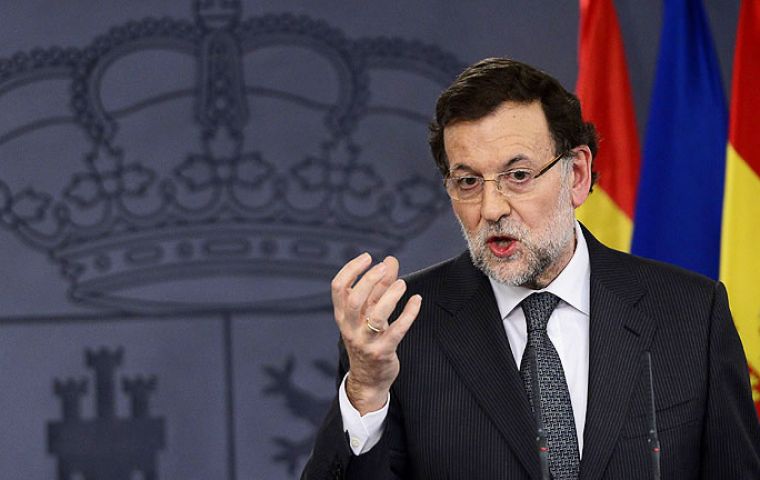MercoPress. South Atlantic News Agency
Catalonia lawmakers have asked Madrid for a referendum on the region's future
 Pro-independence leaders in Catalonia say PM Rajoy should follow the example of UK PM Cameron with Scotland
Pro-independence leaders in Catalonia say PM Rajoy should follow the example of UK PM Cameron with Scotland Lawmakers from the Spanish region of Catalonia voted to seek a referendum on breaking away from Spain on Thursday, setting themselves up for a battle with an implacably opposed central government in Madrid. The Catalan Parliament in Barcelona voted 87 to 43, with 3 abstentions, to send a petition to the national parliament seeking the power to call a popular vote on the region’s future.
The independence movement in Catalonia, which has its own language and represents a fifth of Spain’s national economy, is a direct challenge to Prime Minister Mariano Rajoy, who has pledged to block a referendum on constitutional grounds.
Independence for the region, which already has significant self-governing powers, is thus considered a remote possibility, but Catalan President Artur Mas is buoyed by a groundswell of public support to defy Madrid with plans for a referendum. Polls show roughly half of Catalans want independence, but as many as 80% want the right to vote on the matter.
Pro-independence leaders in Catalonia say Rajoy should follow the example of British Prime Minister David Cameron, whose government opposes Scottish independence, but is allowing the Scots to decide in a vote later this year.
Outside the Catalan Parliament building, a few dozen demonstrators gathered, both for and against staying in Spain. Many flew the separatist banner - a lone white star in a blue triangle, against the background of Catalonia’s official red-and-yellow-striped flag.
Business and political leaders of all stripes have piled pressure on Rajoy to defuse the situation, perhaps by offering Mas greater control over taxes in exchange for dropping the referendum idea.
Isidre Faine, chairman of Barcelona-based La Caixa, Spain’s third biggest bank, this week called on Spanish and Catalan political leaders to negotiate a “grand pact”.
But Rajoy has so far refused to engage in public talks with Mas.
Critics worry the prime minister’s inertia has fanned the flames in Catalonia. But time may once again be on the side of Rajoy, who over the last two years successfully resisted pressure to seek an international rescue to ward off a sovereign debt default and to force out cabinet members or party leaders during a corruption scandal.
Several factors play into his hands.
An incipient economic recovery could take off, easing tensions over tax distribution, one of Catalans’ main beefs with the central government. The independence drive could falter on internal political tensions in Catalonia or on quiet opposition from big business. And, without international support, Catalans could balk at the idea of having to leave the European Union or give up the euro to gain independence.
Catalonia has always had a strong movement for greater autonomy, but a more radical independence movement took hold in the last few years during a prolonged economic slump that hit all of Spain. The movement is fed by perceptions of unfair tax burdens, frustration with Madrid’s resistance to handing more power to the regional government and friction over the region’s Catalan-language school system.
In 2012 and 2013, millions of Catalans took to the streets on their national day, Sept. 11, demanding the right to vote on breaking away from Spain.




Top Comments
Disclaimer & comment rules-

-

-

Read all commentsWhere does it end though...I would imagine France will not be forthcoming with support, as part of Catalonia is in France, and a large population of Catalans reside there....
Jan 18th, 2014 - 10:36 am 0Would an Independent Catalonia then pressure France for the historic Catalan region...?
It's difficult to see how Rajoy can continue to oppose a referendum and retain any democratic credibility. How can you oppose the wishes of 16% of the population and be democratic. And we should recall that Spain is composed of “autonomous communities”. Spain has 17 “autonomous communities” and 2 “autonomous cities”. And how “autonomous” are you when one guy at the centre says “You're not doing that”. Opposing it on “constitutional” grounds is just laughable. A constitution is a set of fundamental principles or established precedents according to which a state or other organization is governed. Important word there, “governed”. Not “ruled”. “Government ” is an organisation entrusted with running a state for the benefit of its people and in accordance, so far as is possible, with their wishes. When the “constitution” no longer suits, you change it. Rajoy and his PP are actually running is a fascist dictatorship. This is unsurprising as it was founded by Manuel Fraga Inbarne, a member of Franco's government. Reading its history is telling. The Spanish people were “disenchanted” with Francoism. No kidding! Inbarne thought he could move gradually to democracy. He quickly got disabused. His “People's Alliance” failed dismally. And so the process began to make the party more palatable. And where did Rajoy start his political career? In the People's Alliance. So he's one of the “old school”. Let's make no mistake. Rajoy is a fascist. He doesn't believe in “democracy”. And he's proving it every day.With Gibraltar and with Catalonia.
Jan 18th, 2014 - 10:48 am 0Spanish speaking people everywhere oppose self-determination and democracy, neither of which have ever been concepts they really understand or are comfortable with.
Jan 18th, 2014 - 11:28 am 0Commenting for this story is now closed.
If you have a Facebook account, become a fan and comment on our Facebook Page!